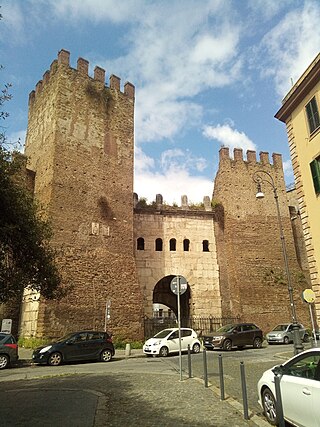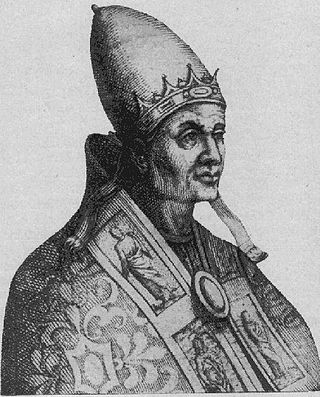Peter was a governor of Rome, Roman consul, and brother of Pope John X. He became consul after the death of Alberic I of Spoleto.
Pope Benedict VII was the bishop of Rome and ruler of the Papal States from October 974 to his death.

Pope Victor III, was the head of the Catholic Church and ruler of the Papal States from 24 May 1086 to his death. He was the successor of Pope Gregory VII, yet his pontificate is far less notable than his time as Desiderius, the great abbot of Montecassino.
In ancient Rome, imperium was a form of authority held by a citizen to control a military or governmental entity. It is distinct from auctoritas and potestas, different and generally inferior types of power in the Roman Republic and Empire. One's imperium could be over a specific military unit, or it could be over a province or territory. Individuals given such power were referred to as curule magistrates or promagistrates. These included the curule aedile, the praetor, the consul, the magister equitum, and the dictator. In a general sense, imperium was the scope of someone's power, and could include anything, such as public office, commerce, political influence, or wealth.
This is an alphabetical index of people, places, things, and concepts related to or originating from the Byzantine Empire. Feel free to add more, and create missing pages. You can track changes to the articles included in this list from here.
Paulus is the original Latin form of the English name Paul. It may refer to:

The Roman Republic was a sister republic of the First French Republic. It was proclaimed on 15 February 1798 after Louis-Alexandre Berthier, a general of the French Revolutionary Army under the rule of Napoleon Bonaparte, had occupied the city of Rome on 10 February. It was led by a Directory of five men and comprised territory conquered from the Papal States. Pope Pius VI was exiled to France and died there in August 1799. The Roman Republic immediately took control of the other two former-papal revolutionary administrations, the Tiberina Republic and the Anconine Republic. The Roman Republic proved short-lived, as Neapolitan troops restored the Papal States in October 1799.

Saeculum obscurum, also known as the Pornocracy or the Rule of the Harlots, was a period in the history of the Papacy during the first two-thirds of the 10th century, following the chaos after the death of Pope Formosus in 896 which saw seven or eight papal elections in as many years. It began with the installation of Pope Sergius III in 904 and lasted for sixty years until the death of Pope John XII in 964. During this period, the popes were influenced strongly by a powerful and allegedly corrupt aristocratic family, the Theophylacti, and their relatives and allies. The era is seen as one of the lowest points of the history of the Papal office.
Lucius is a masculine given name which began use as Lucius, abbreviated L., one of the small group of common Latin forenames found in the culture of ancient Rome. Lucius probably derives from Latin word lux, meaning "light", related to the Latin verb lucere and cognate to the name Lucas. Another proposed etymology is derivation from Etruscan Lauchum meaning "king", which was more directly transferred into Latin as Lucumo.

A consul was the highest elected public official of the Roman Republic. Romans considered the consulship the second-highest level of the cursus honorum—an ascending sequence of public offices to which politicians aspired—after that of the censor, which was reserved for former consuls. Each year, the Centuriate Assembly elected two consuls to serve jointly for a one-year term. The consuls alternated each month holding fasces when both were in Rome. A consul's imperium extended over Rome and all its provinces.

The mayor of Rome is an elected politician who, along with the Rome City Council of 48 members, is accountable for the strategic government of Rome. As Rome is a comune speciale since 2009, the office is different from the offices of the other Italian cities. The title is the equivalent of Lord Mayor in the meaning of an actual executive leader.

The counts of Tusculum, also known as the Theophylacti, were a family of secular noblemen from Latium that maintained a powerful position in Rome between the 10th and 12th centuries. Several popes and antipopes during the 11th century came from their ranks. They created and perfected the political formula of noble-papacy, wherein the pope was arranged to be elected only from the ranks of the Roman nobles. The Pornocracy, the period of influence by powerful female courtesans of the family, also influenced papal history.
The family of the Pierleoni, meaning "sons of Peter Leo", was a great Roman patrician clan of the Middle Ages, headquartered in a tower house in the quarter of Trastevere that was home to a larger number of Roman Jews. The heads of the family often bore the title consul Romanorum, or "Consul of the Romans," in the early days.

Porta Tiburtina or Porta San Lorenzo is a gate in the Aurelian Walls of Rome, Italy, through which the Via Tiburtina exits the city.
Gregory I was the Count of Tusculum sometime between 954 and 1012. Consul et dux 961, vir illustrissimus 980, praefectus navalis 999. He was the son of Alberic II, and Alda of Vienne. His half-brother was Pope John XII.

The Roman Senate was a governing and advisory assembly in ancient Rome. It was one of the most enduring institutions in Roman history, being established in the first days of the city of Rome. It survived the overthrow of the Roman monarchy in 509 BC, the fall of the Roman Republic in the 1st century BC, the division of the Roman Empire in AD 395, the fall of the Western Roman Empire in 476, and Justinian's attempted reconquest of the west in the 6th century, and lasted well into the Eastern Roman Empire's history.
John is a common English name and surname:
Three Popes and the Jews is a 1967 book by Pinchas Lapide, a former Israeli Consul to Milan, who at the time of publication was a deputy editor in the Israeli Prime Minister's press office. The "three popes" are Pope Pius XII (1939-1958), Pope John XXIII (1958-1963), and Pope Paul VI (1963-1978).
The gens Anicia was a plebeian family at ancient Rome, mentioned first towards the end of the fourth century BC. The first of the Anicii to achieve prominence under the Republic was Lucius Anicius Gallus, who conducted the war against the Illyrians during the Third Macedonian War, in 168 BC.

The Tusculan Papacy was a period of papal history from 1012 to 1048 where three successive relatives of the counts of Tusculum were installed as pope.

Caecina Decius Maximus Basilius, was a Roman politician. He was the first consul appointed under Odoacer's rule (480), and afterwards was Praetorian prefect of Italy. He is best known for presiding over the papal election of Pope Felix III.